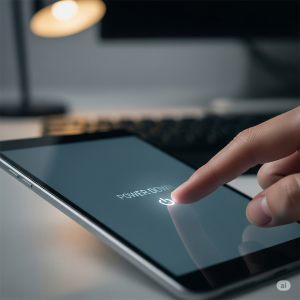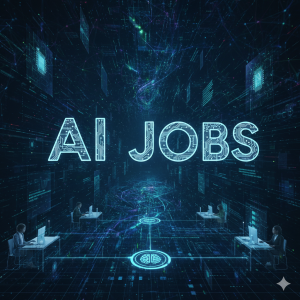The AI Revolution in Recruitment
The world of talent acquisition is undergoing a profound transformation, and at the heart of this change is artificial intelligence (AI). Once seen as a futuristic concept, AI is now a practical tool for recruiters and hiring managers, fundamentally changing how companies find, screen, and hire talent. By automating repetitive tasks, improving efficiency, and providing data-driven insights, AI is helping businesses build better teams and create a more equitable and streamlined hiring process.
From Manual to Automated: The Rise of AI Tools
The recruitment process is often time-consuming, with tasks like sourcing candidates, screening resumes, and scheduling interviews taking up significant time. AI tools are stepping in to automate these processes, allowing recruiters to focus on the human aspects of their job, such as building relationships and making strategic hiring decisions.
Here are some of the most common applications of AI in recruitment today:
• Sourcing and Candidate Discovery: AI algorithms can analyze a vast amount of data from job boards, professional networks, and company websites to identify passive candidates who have the right skills and experience. This allows recruiters to cast a wider net and find talent that might not be actively looking for a new role.
• Resume Screening and Shortlisting: Instead of manually reviewing hundreds of resumes, AI-powered software can quickly scan applications for specific keywords, skills, and qualifications. This not only speeds up the process but also helps to reduce human bias. For example, an AI tool can focus purely on a candidate's work experience and skills, helping to ensure fairness.
• Chatbots and Candidate Engagement: AI chatbots can handle initial inquiries from candidates, answer frequently asked questions about the company or the job, and even schedule interviews. This provides a 24/7 point of contact for applicants, improving the candidate experience and saving recruiters time.
• Interview Recording, Analysis and Summarization: AI can record and transcribe interviews, then use natural language processing to create detailed summaries. This helps hiring managers review key points, identify candidate strengths and weaknesses, and share a concise overview with their team.
• Predictive Analytics: AI can analyze past hiring data to predict which candidates are most likely to succeed in a role, how long they might stay with the company, and even what their salary expectations might be. This provides valuable insights that can inform hiring strategy. For example, a system might show that candidates with a specific type of background have a 30% higher retention rate.
Common AI Tools in Recruitment
There are now so many AI tools that can be used in recruitment. Below are just a few examples.
Sourcing & candidate discovery tools
Eightfold AI, Seekout, hirEZ, Juicebox , Linked In recruiter
Screening and Assessment tools
- Vervoe, Humanly, Skillate, Ideal
Interviewing & Communication
- HireVue, Paradox.ai, Willo, Textio
AI-Powered Applicant Tracking Systems (ATS)
Major ATS platforms are no longer just passive databases; they are now actively integrating AI to streamline the entire hiring workflow. This includes features that are built directly into the ATS, eliminating the need for separate tools.
• Greenhouse: Greenhouse has integrated AI to help with resume parsing, candidate scoring, and talent rediscovery. Its AI can quickly extract key information from resumes and automatically rank candidates based on a job's requirements, all within the ATS.
• Workday: Known for its comprehensive HR suite, Workday uses AI for tasks like candidate screening, skills-based matching, and predicting employee retention. This allows companies to make more informed hiring decisions using a single, unified system.
SmartRecruiters: SmartRecruiters uses AI to enhance candidate sourcing and provide intelligent candidate scoring. The platform's AI can analyze a candidate's profile and provide a "fit score," helping recruiters prioritize the best applicants in their database.
Loxo: a Talent Intelligence Platform that combines ATS and an AI powered CRM. A relatively new market player.
The Impact: How AI Is Changing the Game
AI is not just about making the hiring process faster; it's about making it smarter and more effective. While AI is a powerful tool, it's not a replacement for human recruiters. The most successful approach is a hybrid one, where AI handles the data-intensive, repetitive tasks, and humans focus on the nuanced, strategic work that requires emotional intelligence and personal connection.
The future of recruitment will be a blend of technology and human expertise, with AI serving as a powerful co-pilot. It will lead to a more efficient, fair, and data-driven process that benefits both companies and job seekers.
• Improved Efficiency: Recruiters can save significant time on administrative tasks by using AI tools. This frees them up to focus on high-value activities like building relationships and strategic planning.
• Reduced Bias: AI can help mitigate unconscious bias by standardizing the screening process and focusing on objective criteria. This can lead to a more diverse and inclusive workforce.
• Enhanced Candidate Experience: With AI, candidates can receive faster responses, get their questions answered instantly, and enjoy a more transparent application process. This positive experience can boost a company's employer brand.
Conclusion
AI is reshaping the recruitment landscape, moving it from a reactive, manual process to a proactive, intelligent one. By embracing this technology, companies can find the best talent faster, make fairer hiring decisions, and build stronger, more diverse teams. The AI-powered recruiter is not just a trend; it's the new standard for a modern talent acquisition strategy.


